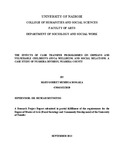| dc.description.abstract | The study sought to establish the effects of Cash Transfer Programmes on Orphans and
Vulnerable Children’s (OVCs) wellbeing and social relations in Nyamira Division of Nyamira County.
There were three objectives to guide the study: To determine how OVC-CT programme
beneficiaries use the Cash Transfer; To establish the perceived effects of the OVC-CT
programme on OVCs food consumption, food security and education according to the
beneficiaries; and To identify changes in social relationships and social status of beneficiaries of
the OVC-CT programme.
The Orphans and Vulnerable Children Cash Transfer Programme is one of the major initiatives
by the Government to support vulnerable groups. Cash Transfer Programmes in the country are a
new approach and are modeled on the successful Programmes in Latin America which operate in
different economic and socio-cultural contexts. Assessing the Programme from the beneficiaries’
perspective is important in order to determine its effects on the beneficiaries’ well being
including social relations.
Quantitative and Qualitative methods and tools of data collection were used in the collection of
primary data. Stratified and Random sampling method was used to identify 72 respondents for
the household interviews and Purposive sampling to select participants for the six Focus Group
Discussions and seven Key Informant Interviews undertaken.
The study found out that the Cash Transfer Programme was having positive effects on the OVCs
wellbeing in terms of food consumption, food security and education. The Cash Transfer is
mainly used for the households basic needs of food, education, medical expenses and some
beneficiaries have invested in small scale businesses and livestock. The amount was however
found to be inadequate to meet all the basic household needs.
The study results for social relations and status were mixed with beneficiaries perceiving their
status to have improved as they now had the means to participate in community social events. On
the other hand, others felt that some non-beneficiaries were jealousy of them which was affecting
their social relations.
The study recommends that the Government up-scales the Programme in the area to cover all
deserving Orphans and Vulnerable Children and possibly the whole country. The monthly
amount should also be increased in order to cater for most of the household’s basic needs.
Further, there is need for public sensitization on the Programme objectives, criteria for selection
and the special needs of orphans and vulnerable children to deal with issues of jealousy and
hostility towards beneficiaries. The beneficiaries should as well be trained on income generating
activities for subsistence upon exit from the Programme and on child participation. | en |

